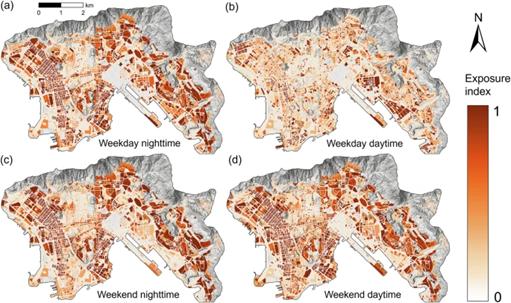Coastal cities face increasing compound flood risks from human mobility patterns under climate change. In this study, we integrated dynamic population distribution models with numerical hydrodynamic modelling to examine mobility effects on flood risk in Hong Kong’s Kowloon area. We simulated flooding across 75 scenarios with matching rainfall and storm surge return periods (50, 100, 200 years) under current conditions and climate projections for 2060 and 2100 under intermediate and very high emission pathways. We found human mobility causes notable temporal shifts in risk distribution, with commercial areas experiencing higher daytime risk while residential areas face increased nighttime risk. Flood risk decreases with distance from coastlines, showing distinct variations between weekdays and weekends. The Night-Day Risk Ratio reveals weekday differentials ranging from 18.7% to 20.6% with minimal weekend variations, intensifying under future climate projections. These insights inform urban planning and flood management in coastal cities.

Global environmental risk patterns are undergoing profound changes, primarily driven by climate change and rapid urbanization. This transformation is particularly evident in coastal cities, as these areas are at the forefront of these challenges. The Intergovernmental Panel on Climate Change (IPCC) projects that under a high-emission scenario (RCP8.5), global mean sea levels could rise by 0.43-0.84 meters by 2100.
Meanwhile, the United Nations (UN) predicts that 68% of the world population will reside in urban areas by 2050, up from 55% in 2018, with most of this growth concentrated in coastal regions. As sea levels continue to rise and coastal populations steadily grow, these areas face an increasingly complex challenge in the form of compound flooding. This phenomenon, where multiple flood drivers occur simultaneously or in close succession, has emerged as a critical issue.
Recent studies indicate that the probability of compound flooding events is increasing globally. For instance, Emanuele Bevacqua et al. found that under a high-emission scenario, compound flooding from storm surges and rainfall will increase by more than 25% globally by the end of this century. Furthermore, the impact of compound flooding will be amplified by rising sea levels, with ~1 in 50 people in 32 major coastal cities in the United States affected by flooding.
This study investigates the complex relationship between human mobility and compound flood risks under sea-level rise scenarios, using the Kowloon area of Hong Kong as a case study. By integrating dynamic population distribution models with coupled hydrodynamic modelling (LISFLOOD-SWMM), we simulate compound flooding events across various return periods and sea-level rise scenarios.
This research develops a comprehensive framework to analyse how population mobility patterns interact with flood risks across different temporal scales (weekday/weekend, day/night) and spatial dimensions. Through systematic assessment of land use patterns and dynamic population distribution, this study aim to provide more nuanced insights into the spatiotemporal variations of flood risks in coastal urban areas.
The findings from this study not only contribute to the theoretical understanding of human mobility-flood risk interactions but also offer practical guidance for adaptive urban planning and flood management strategies.
This research aligns with the United Nations Sustainable Development Goals 11 (Sustainable Cities and Communities) and 13 (Climate Action)27, addressing the urgent need for climate-resilient urban development in coastal regions facing the dual challenges of sea-level rise and increasing urbanization.
Sources:
Communications Earth & Environment
https://www.nature.com/articles/s43247-025-02406-x .
Provided by the IKCEST Disaster Risk Reduction Knowledge Service System
Comment list ( 0 )
